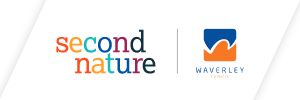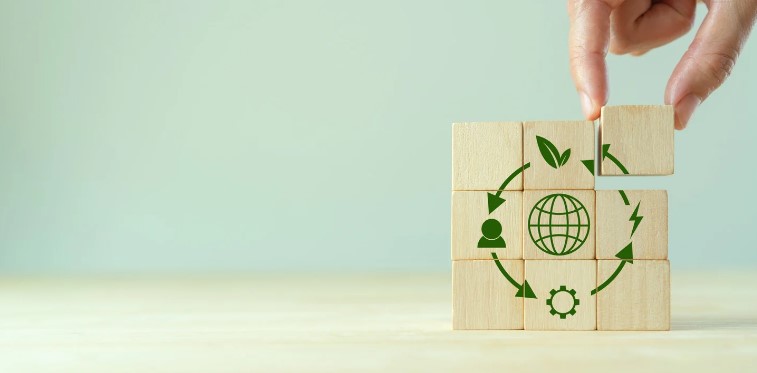Waverley Council's Sustainability and Resilience Officer gives the low down on the circular economy and how you can get in the loop locally.
Have you heard the term circular economy a lot lately, but you aren’t quite sure what it means? Don’t worry, I’ve got you!
Hi, I’m Hayley – I work at Waverley Council as a Sustainability and Resilience Officer, and circular economy is kind of my jam. Among other things, my role here at Council includes developing a circular economy Roadmap for Bondi Junction, and boy, are we excited to share what we have planned with you!
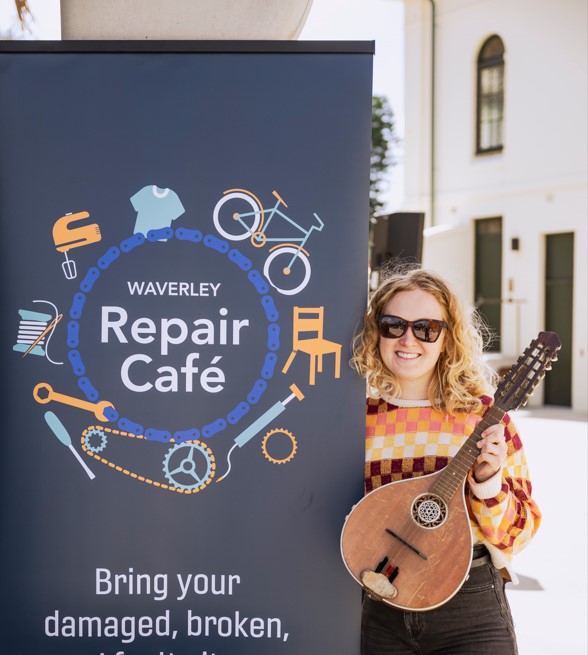
Hayley at Waverley's Repair Cafe!
Why is Waverley Council trying to become more Circular?
Embracing a circular economy means using and reusing resources efficiently, making them as productive as possible and minimising what is thrown away. Achieving circularity means less waste, reduced greenhouse gas emissions, and less harm to our environment while promoting new jobs and innovation. It means supporting processes like reuse, repair, maintenance, refurbishment, remanufacture, composting, and recycling.
Transitioning to a circular economy is essential in the fight against climate change. It helps to reduce our reliance on resource extraction, reduces waste and pollution levels, and promotes nature positivity and regeneration of natural systems.
It also has significant economic potential. There are more than 3x the number of jobs in recycling for every job in landfill, and incorporating circular economy initiatives in the food, transport, and built environment sectors alone can lead to an economic benefit of $210 billion to Australia’s GDP by 2048.
Results from our recent environmental survey also indicate that sustainable waste management and sustainable living is important to our community:
- 96% of respondents agreed that is it very important for Council to support the reuse, repurposing, and recycling of materials
- 90% said that they were recycling, reusing and repurposing their stuff
- 82% said that not wasting resources was a motivation for taking sustainability actions
- 80% are avoiding packaging when shopping, and
- 80% are avoiding single-use items
If you want to know more about the circular economy, check out the Ellen MacArthur Foundation, NSW Government Circular Economy Statement, or papers from the CSIRO, Circular Australia, and Planet Ark.
Why is circular economy relevant to Bondi Junction?
Bondi Junction is home to more than 4,000 businesses and 10,500 residents and has many visitors throughout the year.
Last year, we undertook a Materials Flow Analysis at key sites to identify just how much waste and materials flow through the precinct, and it’s a lot! The top six streams identified were paper and cardboard (4.97m tonnes), packaged and unpackaged food (2.86m tonnes), plastic packaging (3.05m tonnes), textiles (313.14k tonnes), glass (400.96k tonnes), and e-waste (67.43k tonnes).
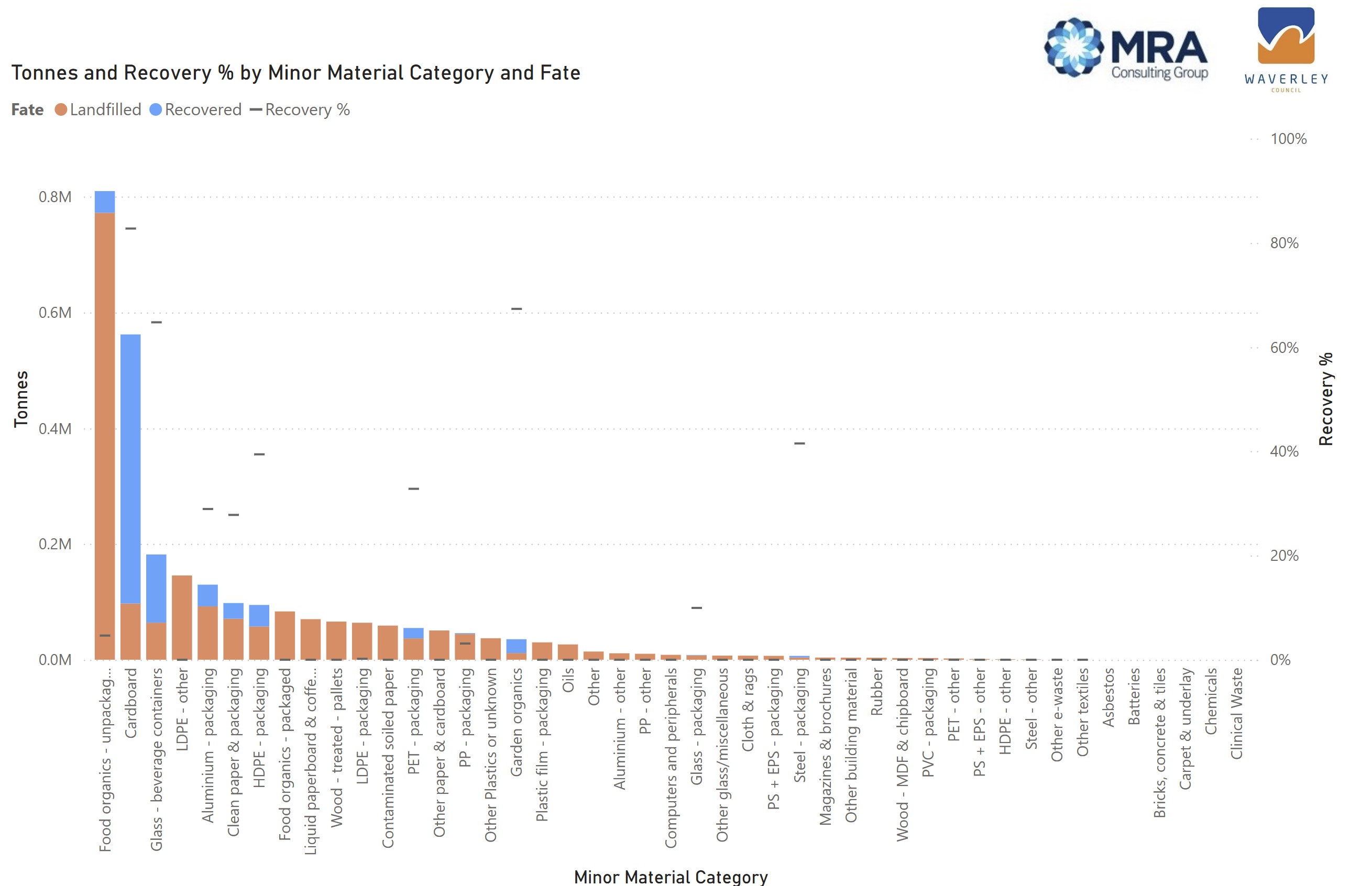 Graph 1: Tonnes and Recovery Percentage by Minor Material Category
Graph 1: Tonnes and Recovery Percentage by Minor Material Category
We also surveyed our Bondi Junction community to gain an understanding of current circularity knowledge, and ideas to minimise waste and maximise resource recovery.
The results suggest that people are engaged and interested in sustainability, they recognise their purchase habits influence waste generation, but they are confused about how to adopt a more sustainable lifestyle. In general, people need increased knowledge, accessibility, and opportunities to become circular and move – as one person put it – “from customer to custodian”.
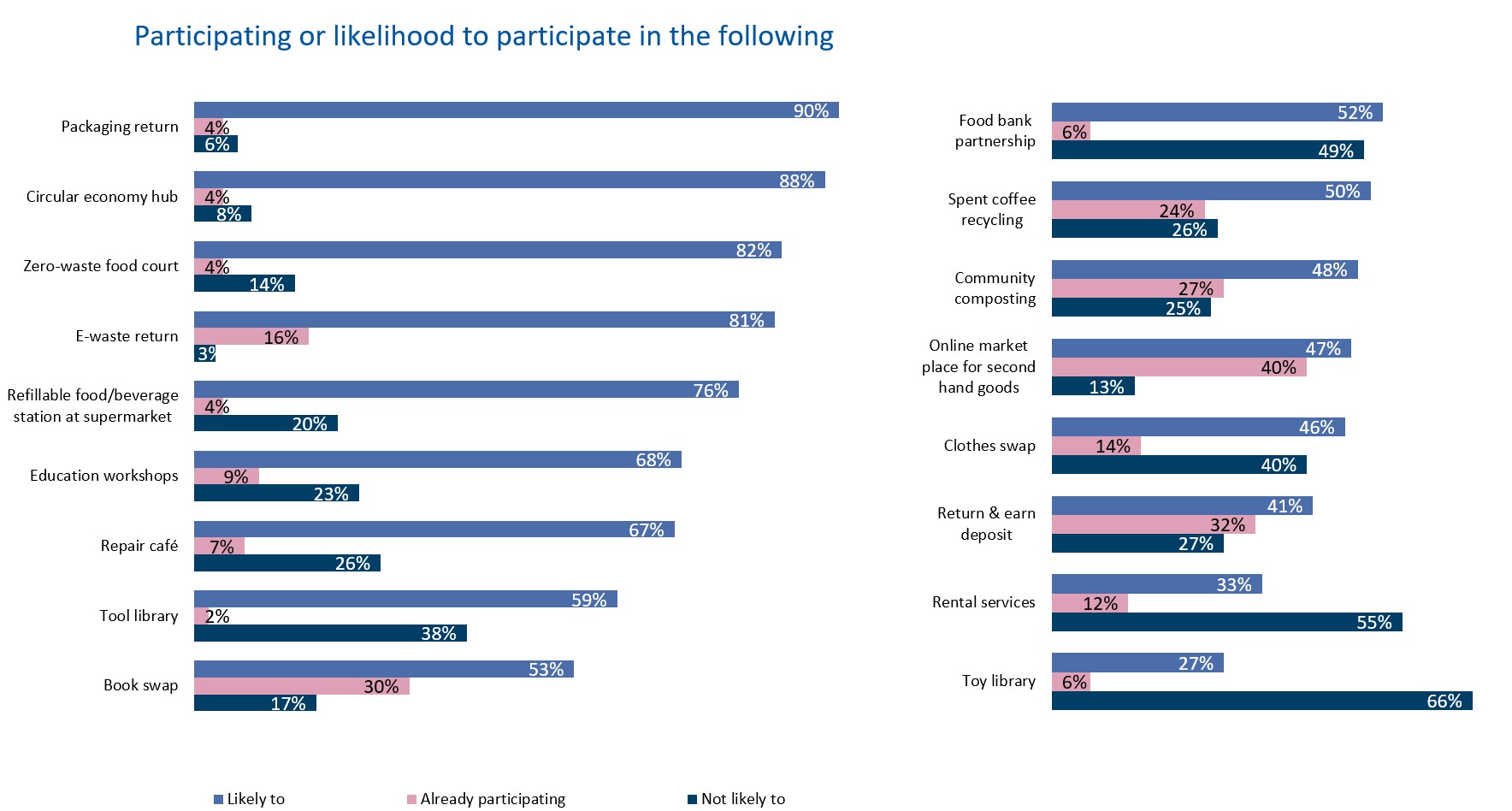
Graph 2: Percentage of respondents participating or likely to participate in circular actions
It was also a great opportunity to see what circular initiatives people will likely get involved with.
So, what’s in the Roadmap?
Together with leading businesses, including Scentre Group, Woolworths, Coles, Easts Group, the Chamber of Commerce, Salvos, Regen Sydney, and key Council sites, we have created a plan to improve, reduce, reuse, repair, and repurpose materials and measure their impacts.
Some of the projects include:
- The fabulous Waverley Repair Café to connect our residents with volunteers who can fix everyday items for free. At our first event we successfully repaired 107/118 items, diverting 116kg from potentially ending up in landfill.
- A Mug Library at the Library, giving customers the chance to choose reuse over single use.
- Online tutorials to support small businesses prepare and adapt to the changing waste regulations.
- B2B networking events to profile leading circular champions.
- Providing sustainable packaging procurement guidance to reduce litter and support better food packaging.
- Building an online reuse directory to address confusion around where and how to donate, repair, buy second-hand, refill, and recycle in Bondi Junction.
We are already underway with quite a few of these projects, so keep your eyes peeled for updates in the Second Nature newsletter!
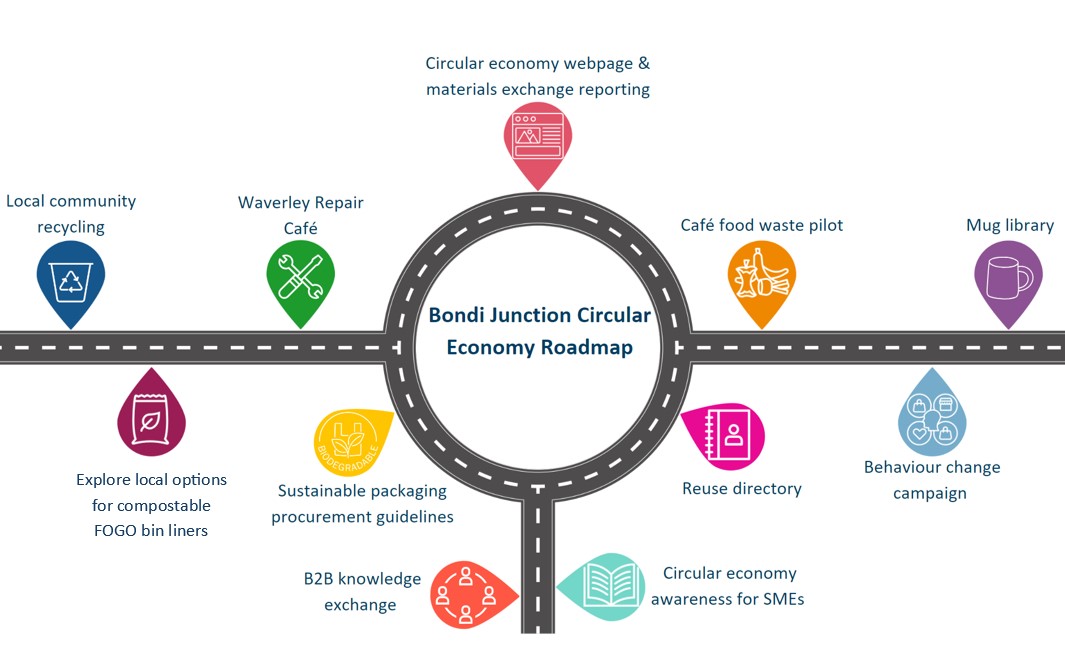 Bondi Junction Circular Economy Roadmap
Bondi Junction Circular Economy Roadmap
What about the rest of Waverley?
From October 2024, Council is introducing a Food Organics and Garden Organics (FOGO) service, starting with a one-year trial on select households. To complement this, we will also launch some exciting events and workshops to help you reduce food waste, which are open to all residents. For more information about the FOGO trial and to submit feedback, please visit our Have Your Say page.
We have just finished consultation on our draft Resource Recovery and Waste Strategy, which received outstanding support from 74 community contributors. The strategy outlines how we will use the waste hierarchy to embed circular economy throughout Council’s waste services and operations.
Regen Sydney has recently embarked on our inaugural 12-month Thinker in Residence program using doughnut economics to elevate local sustainability initiatives. Check out how to get involved in their upcoming events here!
We are also taking part in Australia's beloved Garage Sale Trail. Mark your calendars for two huge weekends, 9-10 and 16 – 17 November, as over 3 million pre-loved items are set to find new homes nationwide. Register as an individual seller or join a group, and if you're not looking to sell, come along and pick up some fantastic bargains.
How can I become more circular in my day-to-day life?
Adopting a more circular and sustainable lifestyle is easier and cheaper than most people think, it can actually save you money! Here are some easy ways you can live more sustainably today:
- Use and reuse: There's no need to buy the newest reusable water bottle or cup. The most sustainable way to live is to use what is already in circulation. Great ways to do this include using a kitchen mug instead of a new reusable one, keeping glass jars for food storage, or saving wrapping paper to reuse at your next celebration.
- Say no to single use: use your mugs, keep cups, drink bottles, glass jars, containers, cutlery, and bags when out and about. Buy reusable bathroom, hygiene, kitchen, and other household products. And don’t bag your fruit and vegetables in single use produce bags at the supermarket.
- Repair and reuse: check out your local repair café or google relevant repair shops to find local professionals who can breathe new life into your items. You could also learn a new skill at Transition Bondi’s mend and remake workshop, the Bower workshops, or other workshops in your local area.
- Donate your pre-loved items: We all know about clothing bins, but you can donate almost anything (if it’s in okay condition!). Check out organisations like The Reconnect Project for old devices, Candle Exchange for old candle jars, and ReLove for old furniture, or just Google what you want to rehome.
- Sell your pre-loved items: There are many platforms for selling pre-loved items, including Facebook Marketplace, Depop, Gumtree, or your local Buy Nothing group.
- Borrow instead of buy: you can borrow anything from baby equipment to clothing to a lawnmower! Borrowing items that you don’t use often, will only use for a short time, or will only use once saves storage space, money, and resources.
- Buy responsibly: buy second hand, recycled, sustainably sourced, repairable, or high-quality items. Be aware of greenwashing and research brands' sustainability credentials before you buy.
- Buy ‘imperfect’ fruit and vegetables: did you know up to 25% of all produce in Australia doesn’t leave the farm because it isn’t pretty enough? Check out businesses like Funky Food, Farmers Pick, and Good & Fugly that ship perfectly edible imperfect produce straight from the farm to your door, saving it from landfill and boosting revenue for our struggling farmers.
- Reduce food waste: The average Australian household produces $2,100 worth of food waste each year. You can reduce this by planning meals, labelling and prioritising products with a short use-by date, using leftovers, freezing meals, and learning how to store your food best. Love Food Hate Waste has other handy tips on how to reduce your food waste.
- Compost: Composting food scraps nurtures soil health and keeps food waste out of landfill. Check out Compost Revolution for handy tips, or see if there are any local community gardens or schools to which you could donate your food scraps.
- Check out our A-Z Waste and Recycling Directory which provides advice on how to recycle and sustainably dispose of your unwanted items. While you’re at it, check out Councils other great resources including how to separate your waste, book a clean-up collection, report illegal dumping and littler, or our waste management guide for apartments.
- Keep an eye out for our Second Nature events to learn more!
If you have any questions about the circular economy or how to adopt a more sustainable lifestyle, you are welcome to email me at environment@waverley.nsw.gov.au
Also, don’t forget to Have Your Say on the future of plastics in NSW!

